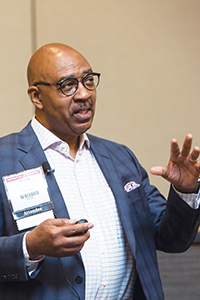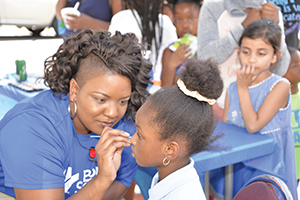By JULIE MINDA
DALLAS — The stakes are high for ministry providers to get community benefit right. It's not just that government entities and insurers are watching and incentivizing nonprofit health care providers to ensure they address people's socioeconomic needs. It is also that doing this work effectively is central to the mission of Catholic health care. Homelessness, addiction and mental health concerns cause suffering for individuals and communities; and ministry providers want to be part of the solution.

Dr. Samuel Ross
Photo by Jerry Naunheim Jr./© CHA
Six ministry community benefit leaders told a gathering of their peers that their systems and facilities are doing all they can to maximize the reach and impact of their community benefit work, for the good of struggling community members. During CHA's pre-assembly community benefit program on June 9, the presenters said that community needs are so great that no one health care system or facility could tackle all of them independently.
Because the social problems at the center of community benefit work are intractable, it is essential to build deep and lasting collaborations with like-minded organizations. These themes emerged during a program called "The Heart of Community Benefit — Relationships, Accountability and Impact."
"How do you go farther in and deeper down in community benefit work?" Dr. Samuel Ross asked. "It's through relationships and partnerships." Ross is president of Bon Secours Baltimore Health System and chief community health officer of Bon Secours Mercy Health System of Cincinnati.
Innovative approaches
During the gathering, Ross and the other contributors described how their organizations have pursued partnerships to address community needs.
Bon Secours Baltimore is a stabilizing anchor institution in West Baltimore, one of the most violent and impoverished sections of the city. By only creating programming that residents have asked for, and by always involving the residents in program design, Bon Secours Baltimore and its dozens of partner organizations are taking on poverty, crime recidivism, problems with health care and mental health access, unemployment, urban blight, family and housing instability in West Baltimore.
Phoenix's Dignity Health Arizona and a health plan it co-sponsors called Mercy Care Plan have created a coordinated care model for a vulnerable patient population. They help their 20,000 plan members — all of them insured under a Medicaid contract — to more easily access medical and behavioral health care from Dignity Health and partnering organizations. Many in the patient population have serious mental health conditions. With these conditions addressed in an ongoing way, clients have gained the stability needed to accept help with socioeconomic needs, according to presenters Douglas Watson, chief financial officer of Dignity Health Arizona, and Lorry Bottrill, chief executive of Mercy Care Plan.

As part of its community benefit work, Bon Secours Community Works hosts back-to-school open houses. Tiffany Solomon, a family support specialist, doubles as a face painter at one such event.
Courtesy of Bon Secours/© Harry Connolly
To enhance the impact of its community benefit work, Mount Carmel Health System in Columbus, Ohio, has added a rigorous assessment and reporting protocol, said Ladonya Brady, the system's director of urban health. Now all people receiving services through Mount Carmel's six community benefit initiatives, as well as through several hospital departments, are screened for socioeconomic needs and referred to partner organizations that can meet those needs. Intensive case management is available to program clients with the greatest level of needs.
Chief Executive Medrice Coluccio and Chief Nursing Officer Michelle James, both of Providence Health and Services of Southwest Washington, told the audience about a Community Care Center the system has helped to create in Olympia, Wash., where unsheltered people can get many of their pressing needs met in one stop. Clients can shower, wash their clothes and grab some food. And they can meet in-person with representatives of organizations that can assess and address their medical, mental health and social services needs.
Good partners
Although the presenters' organizations are taking very different approaches to social determinants of health work, all said the clients must be at the heart of all program planning, development and evolution. They said partnering organizations must be chosen carefully for mission fit and commitment to the work.
The presenters said consistent, transparent communications are essential to maintaining fruitful partnerships that multiply the partners' reach and impact.
The presenters said that working productively with a partner requires both parties to adapt new approaches to their work. This requires buy-in from the people who do the work, a goal best achieved by making sure associates understand the purpose and goals of the changes. People will resist change if they don't know why it's needed, multiple presenters said.
Accountability and measurement also are essential. Organizations must prove the value of their approaches and attract more partners and funding, the presenters agreed. Several presenters stressed that their organizations' data demonstrate that people whose basic socioeconomic needs are met are less likely to access the emergency department for nonemergency needs. When psychiatric services are available and accessible in the community, people with chronic mental illness are less likely to come to the emergency room in crisis.
Meaningful community benefit work is "complex, messy and not for the faint of heart," acknowledged Providence's James.
But, said Brady, "if we better align resources (with our partners) and ensure the information we're providing to people is relevant, we'll improve outcomes" — both for individual patients and for the broader community.
"To have a lasting impact, we must address the needs outside our walls," she said.